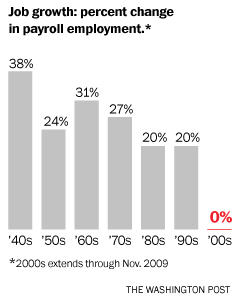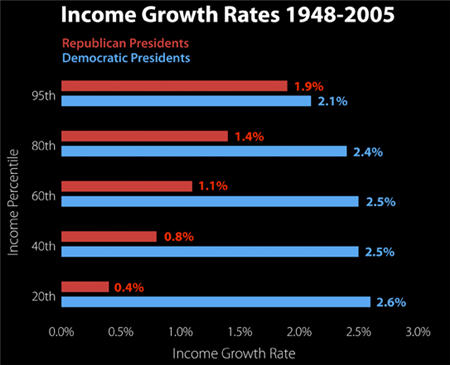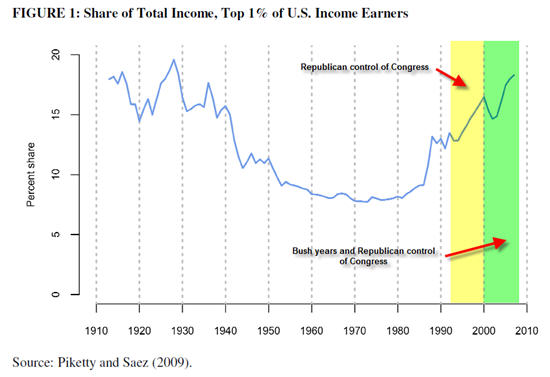American Amnesia
Two years into Democratic control of the executive and legislative branches, there seems to be a wave of nostalgia for the good ol’ days of the Bush years and Republican control of the House and Senate. Is that desire to see Republicans in control a matter of policy or a matter of American Amnesia? Let’s take a look at a couple of outcomes of Republican rule during the Bush years.
Did Republican tax cuts for wealthy create jobs?
Republicans are promising something that they couldn’t deliver when they were in control of the congress and presidency during the 2000s and that’s job growth. Their Pledge to America states:
Permanently Stop All Job-Killing Tax Hikes: We will help the economy by permanently stopping all tax increases, currently scheduled to take effect January 1, 2011. That means protecting middle-class families, seniors worried about their retirement and the entrepreneurs and family-owned small businesses on which we depend to create jobs in America.
Zero, yes, ZERO job growth during the 2000s:
Aughts were a lost decade for U.S. economy, workers
There has been zero net job creation since December 1999. No previous decade going back to the 1940s had job growth of less than 20 percent. Economic output rose at its slowest rate of any decade since the 1930s as well.
Middle-income households made less in 2008, when adjusted for inflation, than they did in 1999 — and the number is sure to have declined further during a difficult 2009. The Aughts were the first decade of falling median incomes since figures were first compiled in the 1960s.
What was the hallmark of Republican rule during the decade? Lower taxes on the wealthy produce more jobs. But, in fact, those historically low tax rates produced ZERO job growth. What are Republicans telling the electorate this election cycle? Yup, same old thing – lower taxes for the wealthy will create jobs. Apparently past facts are not important to Republicans or their nostalgic supporters.
Job outsourcing
Are people fondly remembering the Republican years where millions of American jobs were outsourced?
The Plight of American Manufacturing
For American manufacturers, the bad years didn’t begin with the banking crisis of 2008. Indeed, the U.S. manufacturing sector never emerged from the 2001 recession, which coincided with China’s entry into the World Trade Organization. Since 2001, the country has lost 42,400 factories, including 36 percent of factories that employ more than 1,000 workers (which declined from 1,479 to 947), and 38 percent of factories that employ between 500 and 999 employees (from 3,198 to 1,972). An additional 90,000 manufacturing companies are now at risk of going out of business.
Job Tracker: Outsourcers Can Run, But Now They Can’t Hide
In the past decade, more than 5 million manufacturing jobs and 850,000 information sector jobs have disappeared—many of which have been shipped overseas. This outsourcing is encouraged by faulty trade and tax policies that corporate executives use to boost record-breaking profits and outrageous and obscene executive salaries.
Ah, those memorable days of seeing millions of jobs off-shored encouraged by Republican business tax cuts
Income inequality
Did the rich get richer during the Republican years? Yes they did, but that’s probably not the real problem since most people don’t mind seeing others make a good buck. But when that wealth was created at the expense of the middle class and poor, then it’s an entirely different story:
Income Inequality Is At An All-Time High: STUDY
Income inequality in the United States is at an all-time high, surpassing even levels seen during the Great Depression, according to a recently updated paper by University of California, Berkeley Professor Emmanuel Saez. The paper, which covers data through 2007, points to a staggering, unprecedented disparity in American incomes. On his blog, Nobel prize-winning economist and New York Times columnist Paul Krugman called the numbers “truly amazing.”
“…while the bottom 99 percent of incomes grew at a solid pace of 2.7 percent per year from 1993-2000, these incomes grew only 1.3 percent per year from 2002-2007. As a result, in the economic expansion of 2002-2007, the top 1 percent captured two thirds of income growth.”
Republicans aren’t shy about their support for the wealthy at the expense of the middle class even though they don’t state that outright, but when looking at how each income bracket fares under Democrat or Republican presidents, it’s obvious that the less than wealthy are much better off under a Democrat than a Republican. As Slate reported in an excellent presentation: The United States of Inequality
Did the United States grow more unequal while Republicans were in power? It sounds crude, but Princeton political scientist Larry Bartels has gone a long way toward proving it. Bartels looked up income growth rates for families at various income percentiles for the years 1948 to 2005, then cross-checked these with whether the president was a Republican or a Democrat. He found two distinct and opposite trends. Under Democrats, the biggest income gains were for people in the bottom 20th income percentile (2.6 percent). The income gains grew progressively smaller further up the income scale. But under Republicans, the biggest income gains were for people in the 95th percentile (1.9 percent). The income gains grew progressively smaller further down the income scale (1.4 percent for the 80th percentile, 1.1 for the 60th percentile, etc.).
How much have the top 1% of earners gained as a percentage of American total wealth over that past 20 years. Quite a bit as the graph below illustrates:
While the longing for a return to the Bush years of ever rising home prices accommodated by easy credit, fraudulent documentation and the frantic flip-that-house “investor” mentality may be alluring, it’s gone for the foreseeable future. But if you are yearning for a Republican congress to save the day, you can depend on the return of a few other economic conditions; less job creation, more job off-shoring and greater income inequality.
Can Democrats address all those problems quickly? Not likely, especially with continued Republican obstructionism in the Senate and their own inability to take a forceful stand on many issues. On many occasion Democrats have been their own worst enemy. As an example, Democrats weren’t able to pass a small business bill they championed without having to cut future food stamp benefit funds. But two years of Democratic control cannot undo all the problems that took more than eight years of Republican rule to create. Shared power may force both parties to compromise, but that’s not likely to happen as the Clinton years showed so well.
George Santayana; “Those who do not learn from history are doomed to repeat it.”
Tags: congress, economic, economy, income inequality, job creation, tax cuts












[…] This post was mentioned on Twitter by The Tiffany Group and Karen Bice, layofflist. layofflist said: American Amnesia: Nostalgia for zero job creation and greater income inequality http://bit.ly/8XZoLA […]
It numbs the mind to think how ill informed this country is.
Scary that more people know who is on “Dancing with the Stars” than who is running their government.
[…] a lost decade – CBS News The Lost Decade for the Middle Class | Jared Bernstein | On the Economy American Amnesia: Nostalgia for zero job creation and greater income inequality | The Layoff List Jobs a dim memory for long-term unemployed – CBS […]